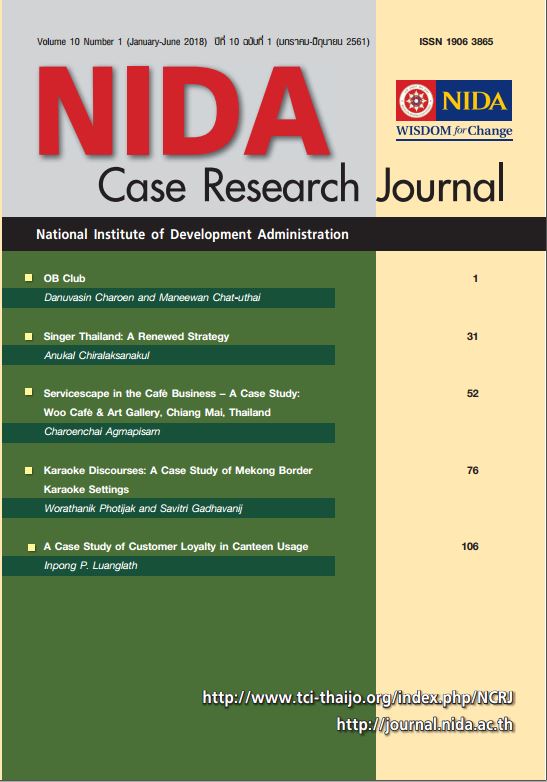Karaoke Discourses: A Case Study of Mekong Border Karaoke Settings
Main Article Content
Abstract
This case study provides scene surveys and discourse surveys of the Mekong border karaoke bars in three districts; Khemmarat, Nataan, and Khong Chiam, of Ubon Ratchathani province. This study will illustrate contrastive characteristics of city zone karaoke bars, unique attributes of the Mekong border karaoke bars, as well as highlight the uniqueness of the Mekong border karaoke business. The case study will explore discourses circulating in the Mekong border karaoke communities. The findings reveal that the characteristics of city zone karaoke bars and the Mekong border karaoke bars are different. The Mekong karaoke bars sustain their business viability on hidden sexual services. Khong Chiam karaoke bars are more touristic and systematically managed, however, the sexual service available in the karaoke bars is similarly highlight. The lived experiences of young Laotian karaoke service girls who live and work in the karaoke bars are confined within conditions of their karaoke service and sexual service work. In terms of discourses, there are various discourses produced, maintained, and reproduced within the complex Mekong karaoke communities. In term of instruction, this case study demonstrates fieldwork processes according to Nexus Analysis method.
Article Details
References
Changchamtrat, K. (2001). Dehumanization Resistance Process of Karaoke Girls. Chiangmai: Center for Women Studies, Faculty of Social Science, Chiangmai University.
Phondee, W. (2003). A case study research on disadvantages; poor and social vulnerable groups: Sex workers living a two-sided life. Thailand Research Fund (TRF).
Phonphiphit, R. (2003). A case study research on disadvantages poor and social vulnerable groups: from regional girls to karaoke cuties. Thailand Research Fund (TRF).
Photijak, S. (2015, January, 25). Focused group interview with N. Thaweesap.
Photijak, S. (2015, January, 27). Focused group interview with D. Thaweesap.
Photijak, S. (2017, February, 22). Personal interview with an Ex-Karaoke Owner.
Ploypeth, W. (2015, January 6). Personal interview.
Tangthanaseth, R. (2011). Ways of life and STDs Protection Behaviors of Women in a special Occupation in Karaoke Business: A Case Study of Chiangkhong District, Chiangrai Province. Faculty of Social Development, National Institute of Development Administration.
Thaothawin, N. (2005). Perceptions of Sexual Violence of Laotian Sex Workers Working in Southern Isan, Thailand. Bangkok: Princess Maha Chakri Sirindhorn Anthropology Centre (Public Organisation).
Sangsawan, S. (2014, October 13). Focused group interview.
Sattrakhom, T. (2014, July 12). Personal interview.
Srikham, W. (2012). AIDS Perceptions of Laotian Migrant Workers in Isan. Proceedings of the 8th International Conference on Humanities and Social Sciences (pp.487-493). Khonkaen: Faculty of Humanities and Social Sciences, Khonkaen University.
Scollon, R. (2001). Mediated Discourse: The Nexus of practice. London, New York: Routledge.
Scollon, R., & Scollon, S. W. (2004). Nexus Analysis: Discourse and the emerging internet. London, UK: Routledge.
Waiyawan, L. (2014, 12). Focused group interview.

